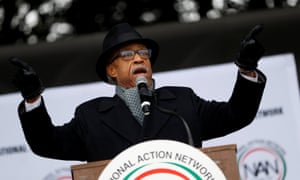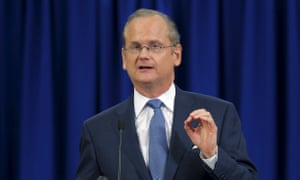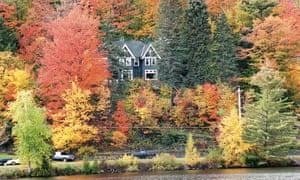Anti-Trump ‘alternative inauguration’ to toast president-elect’s popular vote loss

In conservative upstate New York an alternative inauguration party will hail the fact that 3 million more people voted for Clinton as defiance spreads nationwide

On the evening of 20 January, just a few hours after the former host of Celebrity Apprentice has taken the oath of office to become the 45th president of the United States, about 80 people in the tiny snowbound town of Saranac Lake in heavily conservative upstate New York will gather for an inauguration party.
The event is being billed as a celebration, a chance to rejoice in the electoral victory that saw their political ideals prevail. Food and drink will flow freely, musicians from across the area will perform. The Stars and Stripes will be flown to denote the deep patriotism of the event. And then at the height of the night the carousers will participate in a rendition of Leonard Cohens Hallelujah, with lyrics specially rewritten for the occasion.
Trump said hed make us great again
But we dont even trust the man
He lies and cheats and tries to foster anger
As the lyrics suggest, the party will not be honoring the electoral victory of the newly enshrined President Trump. On the contrary, Saranac Lakes Alternative Inauguration Party will mark the defeat of Donald Trumps brand of anti-establishment xenophobic nationalism.
A celebration of Trumps defeat on the day of his inauguration seems several stages beyond fanciful. The real estate billionaire did after all pull off one of the biggest electoral surprises of modern times.
Yet the progressive inhabitants of Saranac Lake are not alone in such thinking. Across the country, a growing chorus of influential voices can be heard exhorting liberals not to wallow in despondency in the wake of the Trump ascendancy, but to embrace optimism and celebrate a victory of their own.
From national leaders such as Bernie Sanders and the Rev Al Sharpton, to state authorities on both coasts, through urban bastions and university towns scattered across the heartlands, a unifying message is emerging. Do not despair, it says, we won!
The counterintuitive idea of liberal victory in the 2016 presidential race is posited on Hillary Clintons startling triumph in the popular vote. With the final tally of votes now certified by all 50 states, the definitive result of the presidential election carries quite a punch.
Clinton attracted the support of 65,844,610 Americans. Trump was backed by 62,979,636. Which means that fully 2.9 million more Americans voted for Trumps Democratic opponent than for him.
Whether those millions voted because they liked Clintons vision for the country, or because they detested Trumps, is impossible to say. But it is fair to say that Trump failed to persuade a majority of voting Americans to back him on his unlikely journey to the White House.
National political leaders have begun, like the folk of Saranac Lake, to draw strength for the no-doubt brutal fight ahead by focusing on the popular vote as a measure of the depth of support for progressive values that persist in the US today. Bernie Sanders, who played no small part in boosting Clintons numbers by inspiring young people to rally to the liberal cause, told the Guardian that in his view the president-elect had to take on board the truth of his defeat in terms of national votes and act accordingly.
Mr Trump has got to understand that he does not have a mandate. He lost by almost 3 million votes.
Sanders went on to say that the knowledge that most voting Americans backed progressive policies on 8 November should embolden people as the new Trump era begins. If we stand together, we can effectively take on Mr Trumps ugly ideas and continue the fight for a progressive vision for this country. On virtually every major issue facing this country whether its raising the minimum wage, pay equity for women, rebuilding our infrastructure, making public colleges and universities tuition-free, criminal justice and immigration reform, dealing with income and wealth inequality the strong majority of the American people are on our side.

For civil rights activist Al Sharpton, the issue of the popular vote is especially poignant and personal. On 20 January 2001, as George Bush was being inaugurated at the Capitol building having lost the popular vote to Al Gore, Sharpton staged a shadow inauguration in DCs nearby Stanton Park as a protest against what he saw as the stealing of the election.
Last Saturday Sharpton echoed that event by leading a We Shall Not Be Moved march from the Washington Monument to the Martin Luther King Memorial. Again, Sharpton is exercised by the popular vote. As he explained to the Guardian: Numbers do not lie. Most American voters, by almost three million, supported our policies and program our values were not rejected.
Sharpton predicts that the 2016 presidential election will go down in infamy because of the scale of Clintons margin of victory in sheer votes as well as evidence of Russian hacking and other peculiarities. He said the popular vote result should comfort progressive Americans, but more importantly it should energize people to do something about this misdeed. Rather than say we were robbed and then sit around and have a pity-party, we should be getting even.
The We Shall Not Be Moved march will be followed a week later by the climax of the alternative-inauguration wave of 2016: the Womens March on Washington. Hundreds of thousands of people of both genders are expected to descend on Washington or attend some 200 sister marches to be held across the US and around the world.
Linda Sarsour, one of four co-chairs of the march, said that she saw in the popular vote results the dominance of progressive values in the US. We intend to let the president-elect know on his first day in office that we are strong, we are united and we will protect those most vulnerable to attack.
Sarsour also said that she wanted to see more attention paid to the millions of Americans who cast no ballot on 8 November. We are focused on the silent majority, those who sat at home and did not vote at all. We want to understand why they were inactive, so that we can provide the spark that will inspire them to be involved.

Will President Trump hear all these messages as he takes his seat in the Oval Office? Lawrence Lessig, the Harvard law professor who made a brief bid in 2016 for the Democratic presidential nomination, predicts that Trump will ignore calls for him to show electoral humility, just as Bush did in 2001.
The Republicans are so good at the chutzpah of their claim to power minority presidents acting as though they are dominant in the world. We have to develop a way of tamping down their arrogance these are minority presidents who do not represent most Americans.
The idea that Trumps contentious rhetoric from immigration and trade to climate change represents a minority view was what drove Saranac Lake to throw an alternative inauguration party. The town of just 5,500 residents is situated in the middle of the highly conservative rural north country of upstate New York, close to the Canadian border, but it is a liberal oasis, a tiny dot of blue bobbing on a sea of red.
On the morning of 10 November, two days after the election when the entire country was still reeling from the shock of election night, four local friends happened to bump into one another in a shop on Main Street owned by one of them, Barbara Curtis.
The four were all Sanders supporters who had transferred their allegiance to Clinton in the general election, mainly in the hope of blocking Trump. That morning they were each filled with disbelief and despair that a man whom they consider to be a racist and misogynist had been anointed head of state.
We were in a miserable mood, said one of the four, the director of the local library, Pete Benson. But then we had the idea.
The idea began by asking a question: what do we do now? The four decided to set up a new group to generate discussion around that conundrum. They called it Now what?.
As the days passed, and Clintons lead in the popular vote began to grow as late results were counted, they began to see a way forward. It made us think we could be optimistic, said another of the gang of four, Emily Martz, an environmental development worker. The majority of Americans did not vote for the hatred and tolerance of Trump. The values that we believe in, of inclusion and justice for all, freedom of the press and religion and assembly, had in fact prevailed.

Out of that sense of hope the Alternative Inauguration Party was born. It was such a simple idea, but it gave us hope the feeling that we were not alone, said the fourth founding member, Emily Warner.
So just how much of a thumping did Trump take in terms of the popular vote? And why should we care anyway? Under the arcane rules laid down by the Founding Fathers for the selection of the nations head of state, its essentially irrelevant who wins the most votes nationally. Presidents are chosen not directly by the American people, but indirectly through the electoral college that is put together on a state-by-state basis.
Famously, it takes a presidential hopeful 270 electoral college votes out of the total of 538 to win the keys of the White House, and on that official count Trump won handsomely. When the chips were down, according to the centuries-old rules of the game, he soundly defeated Clinton by 306 electoral college votes to 232.
So yes, Trump won, and no amount of brouhaha over recounts and faithless electors and talk of Russian hackers will change that now. But there is another way of looking at the results, one that resonates with the vocabulary of modern democracies in which we the people are supposed to call the shots.
What we think of as democratic legitimacy these days is winning popular support, said John Woolley, professor of political science at UC Santa Barbara. Theres an equation in most peoples minds that in a modern democracy winning means getting more votes than anyone else.
The Now What? group in Saranac Lake like to quote the figure that 72% of Americans of eligible voting age did not vote for Trump a statistic achieved by combining Clintons votes to the almost 8 million ballots cast for third-party candidates and then rolling in the hordes of those who did not vote at all. Other estimates put that figure even higher, at 75%.
The 72% figure should be handled with great caution, as there is no way of knowing what the no-voters would have done had they got themselves to the polling stations. But you dont need to stretch the boundaries of electoral mathematics to know that what happened on 8 November 2016 was historically significant.
Though America is well accustomed to backing presidents who failed to win more than half of the votes cast, winning on the plurality Abraham Lincoln in 1860, Woodrow Wilson in 1912 and Bill Clinton in 1992 all falling into that camp it is very rare for presidents to be elected having garnered fewer votes nationwide than their opponent.
Only five presidents in US history have been put into the White House having suffered such ignominy: John Quincy Adams (1824), Rutherford Hayes (1876), Benjamin Harrison (1888), George W Bush (2000) and now Donald Trump.
Even among that handful of popular vote losers, Trump stands out. Woolley has produced a graph comparing the popular and electoral college vote percentages for all presidential elections since 1824. It shows Trump failing in terms of democratic legitimacy more conclusively than in any other presidential election than that of Adams.
Thats not a flattering comparison from Trumps perspective. Adams was accused in 1824 of in effect bribing his way into the White House by forging a corrupt bargain with another candidate to whom he then gave a plum administration job.
The extent of Trumps defeat is underlined by the 2000 election with its legendary hanging chads. Progressives are still agitated 16 years later by what they denounce as the stolen election, yet in that case Al Gore won the popular vote by only half a million more votes than Bush compared with the margin of almost 3 million enjoyed by Hillary Clinton.
In Woolleys analysis, the size of Trumps popular vote defeat is remarkable. Its a pretty big fact. Because it resonates so deeply with liberals and Democrats and is such a source of anger, Donald Trump is going to be embattled. There is going to be resistance at every turn, and this just fuels the fire.
That might help explain why Trump has been so touchy on the subject. In his eagerness to minimize the significance of the issue he has turned to fake news stories about illegal voting in 2016 touted by the conspiracy theory site, Infowars.
Donald J. Trump (@realDonaldTrump)
In addition to winning the Electoral College in a landslide, I won the popular vote if you deduct the millions of people who voted illegally
The resistance that Woolley predicts can already be seen sprouting across the country. Theres the visible manifestation of it in set-piece marches such as the Womens March and Sharptons We Shall Not Be Moved; there is the spawning of a myriad of social media-facilitated groups like the aptly named Resistance Party; and there is the rapidly developing notion of communities ranging from towns to cities to entire states erecting firewalls around themselves to protect their people, undocumented immigrants included, against any Trump assault.
Here too the advocates of the concept of sanctuary status are drawing sustenance from the popular vote victory. Progressives have been demoralized by the outcome of the election, but keep in mind we won the popular vote, winning the message with Americans, said Ed Murray, the mayor of one of the leading sanctuary cities, Seattle.
Nowhere is the power of the popular vote combined with the concept of sanctuary more evident than in California, a state that Clinton won by a whopping 4.3 million votes, with 61.6% to Trumps 32.8%. Californias secretary of state, Alex Padilla, told the Guardian that he respected the electoral college process and the outcome of the 2016 race, but added: That being said, the result was politically misleading in terms of giving any mandate to the president-elect.
He said that California was more committed than ever to the progressive direction, extending access to quality healthcare, accepting the science of climate change and acting to combat it, and immigration. No state has more at stake when it comes to immigration than us; our economy is dependent on it.
Three thousand miles away on the east coast, New York state is also pursuing the sanctuary concept, Clinton having won there by 1.7 million votes, 58.8% to Trumps 37.5%. But it doesnt feel a strong Democratic state if you are located up in Saranac Lake, surrounded by rural Trump supporters, and they have had to deal with their fair share of local antagonism.
The four organizers of the Alternative Inauguration Party have been lambasted as seditious by trolls on their Facebook page. They found it hard securing a venue for the party, as commercial property owners largely didnt want to know.

But they have also been amazed by how quickly their message of hope has taken root and spread, with liberals as well as moderate Republicans contacting them from as far away as Buffalo to ask for advice. People we never knew or expected to join us are reaching out to us, Emily Martz said.
They called a public meeting to discuss the future of Now What? and 80 people turned out. They rolled out a clothesline across the hall and pinned on to it all the ideas people generated for how to protect progressive values in the coming era of Trump.
After the alternative inauguration party is over they intend to keep going with a new campaign to reclaim the American flag. They are posting images on their Facebook page of the Stars and Stripes beside political slogans, one of which says: The Majority. Our flags are flown against the immoral behavior of Donald Trump. We did not vote for him. WE are Americans!
Martz has ordered herself an American flag, made in the USA and trading at $16.95. It will complement the Stars and Stripes button she has worn for the past two years on her felt hat.
Its there to show pride in our country, she said. And to show people that our values of tolerance and respect are true American values.
Read more: https://www.theguardian.com/world/2017/jan/19/alternative-inauguration-party-saranac-lake